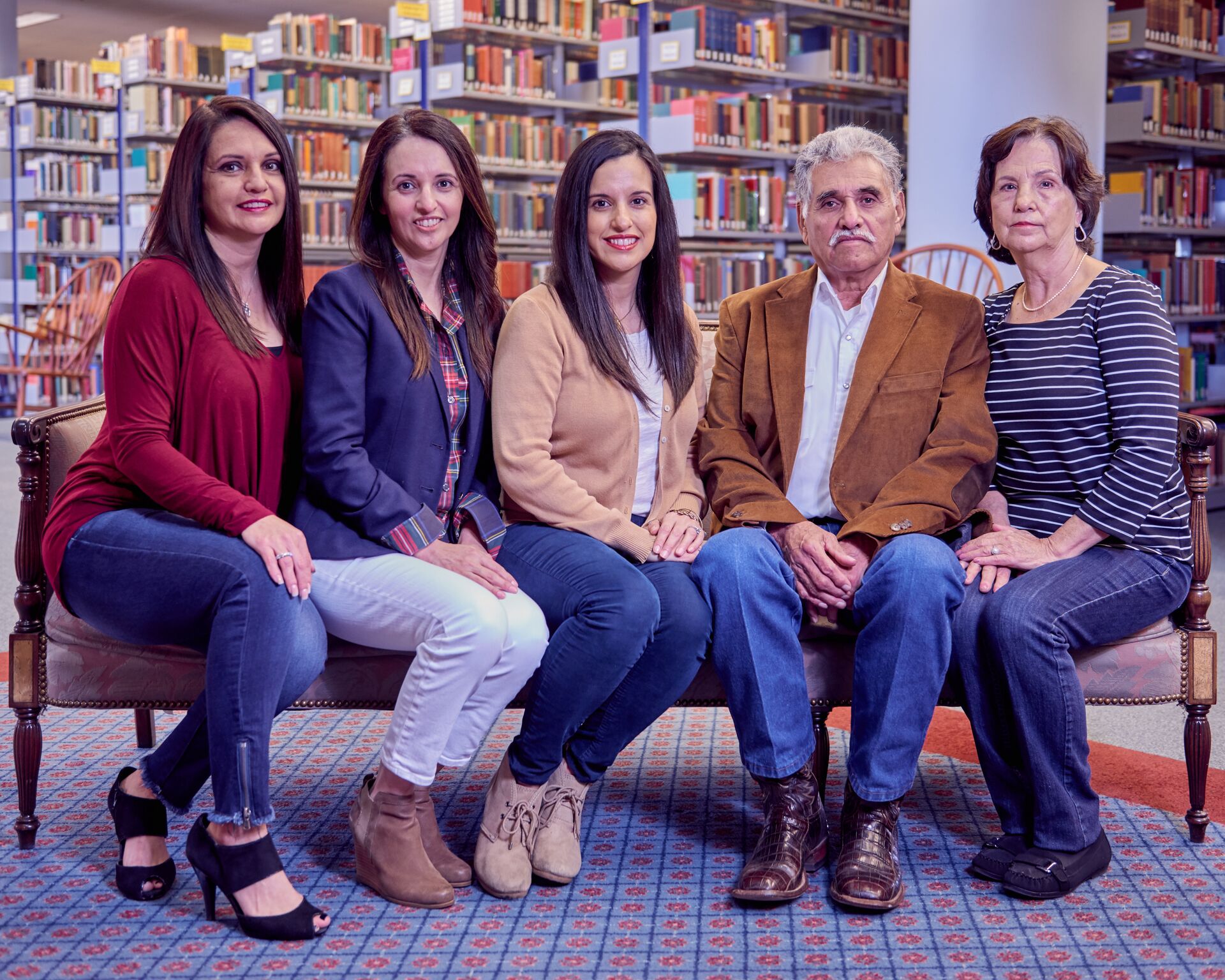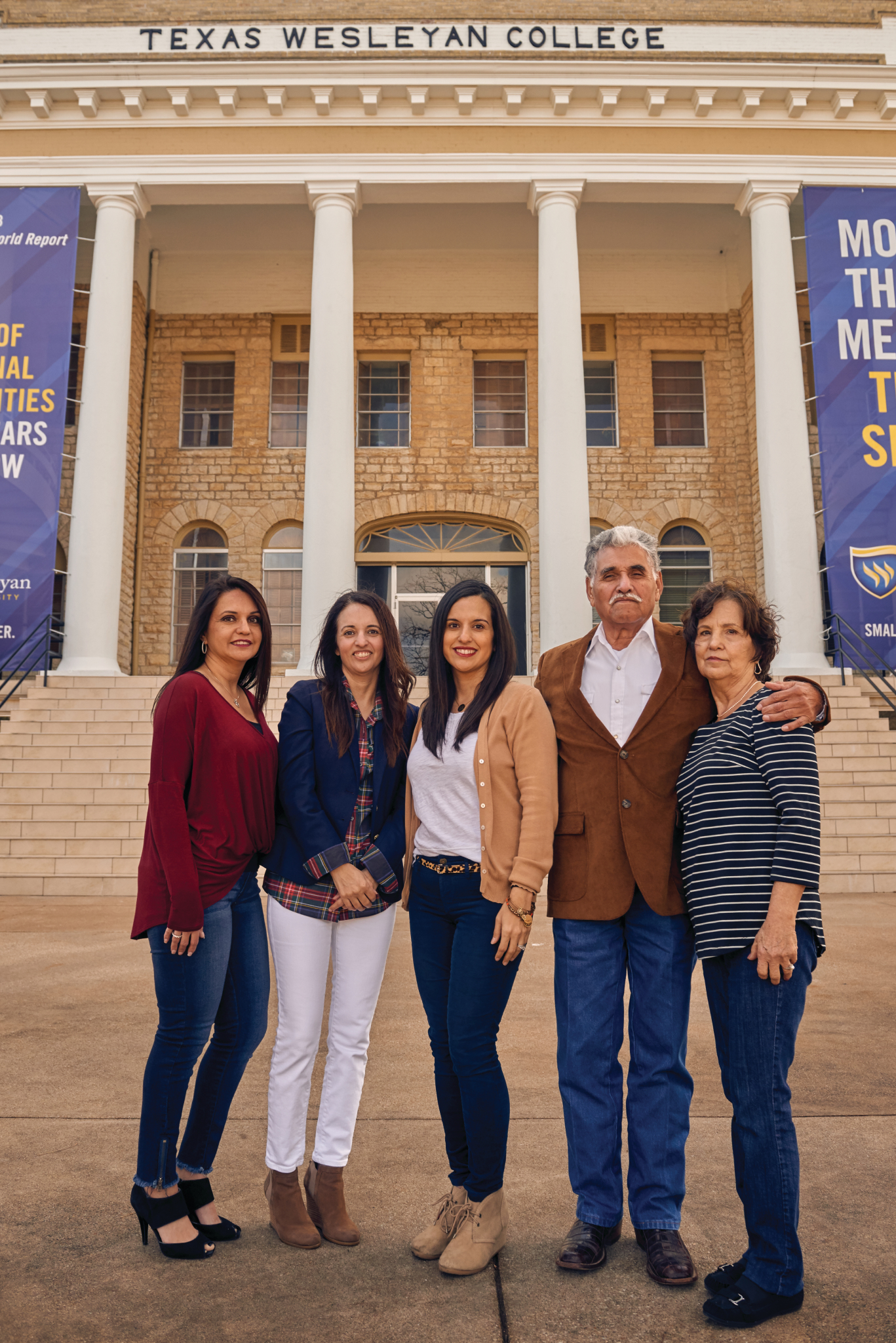Education Starts in the Home
Most of Nadia Alvarez Arriaga’s memories of Múzquiz, México, are coated with a film of dust, finely powdered down by stories of family struggle and grit. In Múzquiz, only a few of the ritziest homes had a patch of grass for a front lawn, and only boys finished high school.
Many of Arriaga’s family members still reside in this sun-scorched village. Her mother, Dora Garcia, went to school in town through seventh grade, and then she began working in a local grocery store. “Once middle school started, education is no longer free, so the thinking was that the woman is going to stay home.” said Arriaga. “So her brothers went to high school, but her sisters and she did not. She started work.”

photo credit: Jeffrey Wooten Creative
Her mother was one of seven children, out of whom only the youngest son went to college. “Maybe that played a part in it for us.” she wondered. “[My uncle] was the one that had the nicer house and the better things, and we saw that… [My mother] saw [education] as a way to a better life.”
Her father, Oscar Alvarez, stayed in school until the end of third grade. He then chose to enter the workforce, first by shining shoes, and then by working in local pool halls before leaving for the United States at the age of 14 to find work in California, Illinois, and Texas. Several deportations sent him back to Múzquiz, but eventually an employee of The Original restaurant on Camp Bowie Boulevard sponsored him to work for the company in Fort Worth. Oscar returned to Múzquiz to wed Dora in 1971. The following day, they headed north to Fort Worth to try and build a better life for themselves and the family they hoped to have.
The following year, Arriaga’s oldest sister, Maria, was born, followed by her other sister Claudia two years later. Nadia is the youngest. Maria and Claudia gained local attention for excelling in school, both graduating as valedictorians from North Side High.
Around the time her older sisters were navigating the secondary school system as bilingual learners, Nadia’s world was being shaken by kindergarten.
“I remember in kindergarten my mom drop[ping] me off at school and having no idea why,” she said. “I remember crying and crying on the first day of school… [which] had interrupted my perfect little life with my mom and dad. And they wanted me to speak English. It was just a confusing year.”
Later in her first year of school, a teacher cautioned that if Arriaga didn’t start speaking English soon, she would be moved to a special reading group. Arriaga’s sisters helped to translate this news to Mrs. Alvarez, whose English was limited at the time. In another memory, Arriaga can see herself being called up on stage as part of a costume contest. Her mother had dressed her as an elf, a hand-me-down costume from a Christmas play one of the other sisters had worn. When the principal asked, “What are you?” Arriaga couldn’t answer.
Now in her eighteenth year as an educator, Arriaga is the one helping kindergarteners learn English at Tanglewood Elementary. This year, she assists a student in another kindergarten teacher’s classroom by translating.
“I just love it.” Arriaga said of her translation work. “It’s made me kind of miss [bilingual teaching] because I see my family in that situation. There were so many times when we were the ones who had to translate for my parents.”
Prior to coming to Tanglewood Elementary thirteen years ago, Arriaga spent a few years as a bilingual educator at M.H. Moore Elementary School and Cesar Chavez Elementary School. She has worked with countless parents of students coming from México and other countries, where a K-12 education isn’t taken for granted, and she can appreciate the sacrifices these parents have made for their children. “They didn’t come here for selfish reasons.” she explained. “[They] were thinking of the future of their children.”
Arriaga tells parents not to fret if children don’t take to English right away, saying that children should not cease practicing their home languages while trying to learn English. She can point to herself as an example of a student who figured out English when she was ready, and she reminds parents that all children are English language learners. In fact, some of the strategies she previously used as a bilingual educator, she now uses for students who are native speakers. Step into her classroom on any given day, for example, and you might hear Spanish songs adding playful ambiance to the children’s lesson.
“What I do a lot is have Spanish songs playing, like ABCs or the months of the year.” said Arriaga. “It’s just soft background noise, or I like to teach them Spanish words, and they just think that’s the neatest thing. Through the day, I’ll hear them sing the songs, and they don’t know what they’re saying, but I figured I’ll plant a little seed. Maybe if they take Spanish in middle school or high school, it’ll come back to them.”
She sometimes feels remorse for not having spoken Spanish more frequently with her three daughters — Jessica, Victoria, and Ava — but time wasn’t on her side during those early parenting years. She had her first daughter during her sophomore year of college at Texas Wesleyan University, which Nadia and her sisters attended because they each secured enough scholarship money to cover the entire cost of tuition for four years. She said her sisters’ advice was instrumental in helping her find money to go to school, and to this day she still seeks their opinions on major life decisions and smaller decisions, like choosing the right paint color.
In addition to going to school full time and being a new mom, during Nadia’s senior year, she began working full time for the Fort Worth Independent School District (FWISD) under an emergency work permit necessitated by a severe teacher shortage. Not long after she graduated, she was pregnant again, and her day-to-day life became all about taking care of her girls in the mornings, dropping them off at her mother’s, working all day, and picking the girls up at night. Ava came along several years later. All three of her girls understand spoken Spanish well for having spent so much time at their grandparents growing up, but Arriaga said speaking is more difficult for them.
While there was never any question that Arriaga would attend Texas Wesleyan, she has been overwhelmingly supportive of her daughters seeking higher education outside of Tarrant County. Currently, Jessica attends the University of Arkansas, where she hopes to study nursing and to recruit younger sister Victoria to be a Razorback. Victoria, a sophomore at Paschal High School, is a talented writer who may be interested in broadcast journalism. For now, the littlest Arriaga, Ava, stays closer to mom as a third grader at Tanglewood Elementary.

photo credit: Jeffrey Wooten Creative
Arriaga’s daughters grew up hearing about how different life was for their grandparents in México, the same stories of struggle that used to “blow our minds,” said Arriaga of her and her sisters. Those stories have inspired success not only in Arriaga as an accomplished educator, but her sister Maria, who went on to be a certified public accountant at Ernst & Young and later a Director within FWISD, and Claudia, who is a municipal judge in Fort Worth. As mothers, all three women have instilled in their children the importance of education, too, and they have seen their children go on to find success at other institutions of higher education, including the University of North Texas, Oklahoma State University, and the University of Notre Dame.
When asked what advice she has for parents, Arriaga shared what she always told her girls: “Circumstances don’t define you. You failed a test? Now you know you need to study harder.”
Only Arriaga can hear the echoes of her parents’ advice in that message. To this day, Mr. Alvarez still prefers to speak Spanish at home, Mrs. Alvarez still cooks three square meals a day, and both parents still push the importance of education as the family’s “key to bigger and better things.”
This article originally appeared in the March/April issue of Madeworthy.
 Doctor Jackie Hoermann-Elliott is the Assistant Director of TCU’s New Media Writing Studio, where she teaches digital composing to Horned Frogs needing to create videos, infographics, blogs, and much more. She wrote for newspapers and magazines around the Midwest before settling down in the Lone Star State. Since she moved here in 2013, she’s written for The Fort Worth Star-Telegram, Indulge, K Magazine, The Dallas Morning News, and GuideLive. Currently, she writes for those fun guys running The Fort Worth Weekly and is a valuable member of the TanglewoodMoms.com team. For fun, she cheers on her husband, Mansfield ISD football coach Buck Elliott, teaches yoga at Yogali off E. Lancaster, practices poses with her amazing bonus daughter, “E,“ and enjoys the newest addition to the Elliot family, “Baby B.“
Doctor Jackie Hoermann-Elliott is the Assistant Director of TCU’s New Media Writing Studio, where she teaches digital composing to Horned Frogs needing to create videos, infographics, blogs, and much more. She wrote for newspapers and magazines around the Midwest before settling down in the Lone Star State. Since she moved here in 2013, she’s written for The Fort Worth Star-Telegram, Indulge, K Magazine, The Dallas Morning News, and GuideLive. Currently, she writes for those fun guys running The Fort Worth Weekly and is a valuable member of the TanglewoodMoms.com team. For fun, she cheers on her husband, Mansfield ISD football coach Buck Elliott, teaches yoga at Yogali off E. Lancaster, practices poses with her amazing bonus daughter, “E,“ and enjoys the newest addition to the Elliot family, “Baby B.“


 Sign in
Sign in

